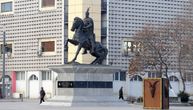How will the change of US president affects the policy with Serbia
And while impressions about the US election days and nights are being collected, in our country the main topic is: will the change of the US president change relations between Serbia and the US?
The elections in the US, the outcome of which was eagerly exected for days by the global and domestic public, ended with the victory of Joseph Biden, who became the 46th President of the United States by defeating Donald Trump. Biden won 273 electoral votes, while Trump won 213. 270 electoral votes were needed for a win. For days, Serbia's public has been considering how the outcome of the the US elections could affect that country' relations with Serbia, taking into account the change in the way our country was communicated with on the most sensitive issue, the issue of Kosovo and Metohija.
And while impressions about the US election days and nights are being collected, in our country the main topic is: will the change of the president change relations between Serbia and the US?
The fact is that the US has not changed its position and that Kosovo is an independent state as far as it is concerned, but Trump's advantage in relation to Serbia was that he also wanted to listen to Belgrade's views. When it comes to Joe Biden, his personal engagement during the 1990s is being recalled, and his not so benevolent attitude when it comes to our country. However, in recent history, Biden visited Serbia twice, in 2009 and 2016, and both visits were accompanied with similar messages.
As he pointed out in 2009, the precondition for US support to Serbia's intention to become an EU member will not be the recognition of its southern province as an independent state. During his second visit in 2016, he expressed his condolences for the first time to all those who their lost loved ones during the NATO bombing.
"Memories of the loss of the loved ones are still fresh. The US and Serbia, of course, do not agree on every issue, there are many scars and wounds that are alive from the 1990s, but I hope that we will take steps and that new generations will do it," said Biden and reiterated that there will not be a demand for Serbia to recognize Kosovo.
President of Serbia Aleksandar Vucic said the night before that it would have been better for Serbia if Trump had won, but that he had good relations with Biden and that he had the opportunity to cooperate with him and meet him several times.
"I said three days ago that Biden will probably win. I think it would have been better for Serbia if Trump had won. I think the same tonight. I will congratulate him, wish him success with the United States, and that's it. I hope that we will be able to have good cooperation with the United States, and I will thank Trump for everything we have done together," he added.
"I never said a single ugly word about Biden, because I saw Biden four or five times. My personal relations with Biden are better than with Trump," Vucic said and stressed that he would wait until the morning to congratulate Biden on the election.
Our interlocutors, experts on the political situation and relations between Belgrade and Washington, agree that Joe Biden's personal relations with Pristina and the Kosovo Albanians are an issue that can cause reservations in relations with Serbia. However, they also point out that the US itself is a deeply divided society, and that the new president will focus on solving internal problems.
"We are counting on the continuation of good relations, Serbia will do everything to continue that process. The key issue in our relations is the issue of Kosovo and Metohija, and there will be no change in the the US position - they recognize its independence and the ultimate goal is to resolve that issue by having Serbia recognize Kosovo. That is their stance and it will not change. I think that in the case of President Biden's administration, that will be even more pronounced," former diplomat Zoran Milivojevic told our portal.
He also stressed that certain changes will probably take place and that the Kosovo issue will now be under the jurisdiction of the State Department, instead of a While House special envoy. Milivojevic also said that there will probably be coordination and rapprochement of positions between Washington and Brussels, and that the US administration will accept that the European Union is the one conducting the dialogue, and leave it to them.
"I think that things will accelerate there, as Europeans are accelerating things, that the Washington administration will agree completely," he says.
When it comes to bilateral relations and what Biden's administration will insist on, it will be resolving the issue of the setting of the the US embassy on fire during a protest in Belgrade and the case of the Bytyqi brothers.
In previous statements for our portal, Milivojevic also recalled the possible insistence of the Biden administration in resolving these issues.
"These are two issues that stand in the way of Serbia-US bilateral relations. And they will certainly be reactivated and must be resolved," he said.
"It is completely clear that the Pristina side will have full support for its positions from the future Biden administration, if he wins the election. And that can be seen from the document, it states: obligatory mutual recognition, Serbia's responsibility for the situation in the 1990s, that Serbia as the aggressor, and that Pristina has the right to war reparations, support for Kosovo to get visa liberalization from the EU, NATO membership, even the insistence of the the US side to solve the case of the Bytyqi brothers is mentioned," Milivojevic recalled and added that everything is directed towards supporting the Pristina side when it comes to their demands related to Belgrade.
They agree that as far as the recent Washington agreement is concerned, it should not be called into question, but they also remind of its "specific form."
"When it comes to the Washington agreement, it is not an agreement of a classic type that binds the state, nor has the US ratified it. It is specific in its character, first of all it is a political engagement and in the formal-legal sense it does not have to obligate this administration. It will obligate it her as much as that administration has an interest and as much as it recognizes some of its interests related to implementing it," Milivojevic thinks.
He says that its economic part is not in question and that the arrival of the DFC in Serbia suits the US, since it is a state institution and that the economy is a key and global issue, which Biden pointed out to in his speeches as well.
"The Washington agreement will not be questioned, but the temporary institutions in Pristina have a very long history of relations with Biden and the Democrats. They don't hide it and all the time they wanted the administration to change, although they did not openly show it. Trump and his administration have not treated Kosovo Albanians as overly big allies, and the fact that none of his key people visited Pristina in the past four years speaks in favor of that. Richard Grenell visited them, who by the nature of things was in charge of the dialogue, but none other of the high-ranking officials," former vice-president of the Serbian National Assembly, Vladimir Marinkovic, recalled.
(Telegraf.rs)

